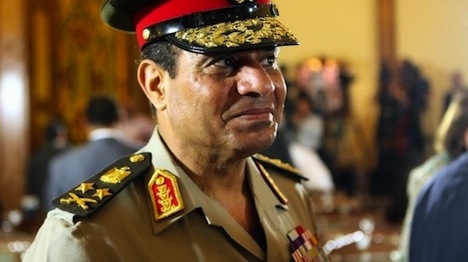
10.69 million.
That’s the number of the Egyptians who voted to ratify Egypt’s new constitution in December 2012 — at 68.8% of the electorate, it constituted more than enough votes to enact it, thereby promulgating the Muslim Brotherhood’s Islamist vision of constitution reform in the world’s largest Arab country a new constitution.
The turnout in the March 2011 constitutional referendum was even higher. In that vote, 14.2 million Egyptians (77.3% of the electorate) approved changes to the previous constitution that were designed to launch a more democratic and representative government by the Supreme Council of the Armed Forces that effectively took control after the fall of former president Hosni Mubarak in February 2011.
So as Egyptians vote today (and tomorrow), it will be the third such post-Mubarak constitutional referendum.
It’s the first vote since the July 2013 military coup that pushed Mohammed Morsi, Egypt’s first elected president, from power. Its passage is all but assured, in light of the arrest or dispersion of many opponents of the new constitution:
“I am telling them, they will be faced with force, decisiveness and strength never seen before,” interior minister Mohammed Ibrahim said on state TV on Monday. “Everyone rest assured, we are watching your back”… State television showed Ibrahim on Monday inspecting some of the 350,000 police and army personnel, including special forces and paratroopers backed by armored vehicles and helicopters, currently being deployed to streets across the country to secure the polls and encourage a high turnout.
That’s not the most reassuring statement that the referendum will be an incredibly free and fair election. Nonetheless, the referendum is seen as the first step in a series of elections that will mark Egypt’s ‘transition’ from military rule to a more lasting democracy. The current atmosphere augurs poorly for future elections set to take place later this year. Under the constitutional reforms, Egypt’s interim government will have three months from the date of the new constitution’s enactment to call either parliamentary or presidential elections, with the other elections to follow within six months from the date of enactment. That means by the summer, Egypt should have both an elected president and an elected legislature.
Despite a genuinely robust marketplace of political actors in Egypt today, the constitutional process seems less like a real transition than a stitch-up for Abdel-Fattah El-Sisi to become Egypt’s next president. El-Sisi (pictured above), who’s currently the minister defense and head of the armed forces, last week indicated he is edging ever closer to a formal run for the Egyptian presidency later this year. While El-Sisi is a charismatic figure with genuine popularity throughout Egypt, it’s hard to believe that he represents much more than Mubarak 2.0 — a strongman willing to sustain a crackdown on Egypt’s Muslim Brotherhood.
More troubling is that hardly anyone in the past three regimes — the initial post-Mubarak SCAF government, the Islamist Morsi government, or the current military government — have prioritized Egypt’s crumbling economy. Poor employment options for a young populace and stagnant economic growth were factors in the initial 2011 protests, but the economic situation has worsened over the past three years as Egypt’s political crisis has deepened.
El-Sisi’s closest competition — and perhaps the greatest hope for a civilian Egyptian government in 2014 — is Hamdeen Sabahi, a leftist, nationalist, neo-Nasserite figure who rose to prominence in the 2012 presidential election. Though Sabahi actually won the highest number of votes in Cairo, he very narrowly trailed the two frontrunners, Morsi and former air force commander Ahmed Shafiq, thereby missing the subsequent runoff. Sabahi, who formed the Egyptian Popular Current (التيار الشعبي المصري) in 2012, has allied with the wider umbrella group of secular liberals, the National Salvation Front (جبهة الإنقاذ الوطني) that’s headed by Mohamed ElBaradei. Sabahi firmly opposed Morsi and initially supported Morsi’s removal, but he’s also indicated that he believes El-Sisi should remain within the military. Given El-Sisi’s rising popularity and control of the current government, it’s difficult to know if Sabahi (or anyone for that matter) has the political power to defeat the general if he progresses with a presidential bid.
Most immediately, the constitutional reforms expected to be promulgated in this week’s plebiscite are wide-ranging (here’s a piece by Bassem Sabry outlining 29 key provisions), and they’re not necessarily all for the worst: Continue reading Egypt’s constitutional referendum enshrines re-Mubarakization →
![]()

